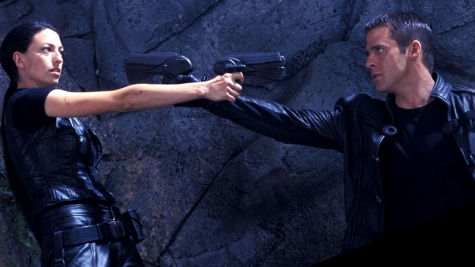Science fiction as a genre has plenty of gorgeous love stories to go around, ones that leave you in tears or fill your insides with fluffy candy heart goulash (just pretend that sounds appetizing…). But for years now, when I think of the words “true love” there is only one pair that continues to impress me with how well they embody the phrase.
Farscape’s John Crichton and Aeryn Sun should be on the cover of a book called “How to Do Romance Right in Storytelling For All the Times Ever.” I will ghostwrite it, if you need me to.
Which is not to say that there aren’t other couples in the SF pantheon that make me all wibbly. I’ll cop to being a sap; I love a good romance as much as I love good villains and snarky dialogue. But Farscape was a show that continually broke ground (even when next to no one noticed), and continued to do so by way of the show’s central couple. It’s not that John and Aeryn are simply destined or lovely together or worth rooting for—it’s that they broke rules for couples on screen. They broke a lot of them. And they did it with such style… and by style I mean that they wore leather pants. Style.
It is essential to realize and remember that most of what this pair had going for them came down to ineffable, stupid luck. Chemistry between actors Ben Browder and Claudia Black was off the charts throughout the show’s entire run, and easily could have ended up as something far less memorable. The casting call for Officer Aeryn Sun demanded a blond-haired blue-eyed woman who would have been ten to fifteen years John Crichton’s junior. Black happened to be reading the part opposite the men trying out for Crichton, and when Ben Browder came in, everybody sat up and took notice… of the two of them. They just worked. Black wanted to be part of the show in any way she could, but would have never been considered for Aeryn initially—she had no idea that by reading opposite Browder, Farscape’s direction would alter entirely.
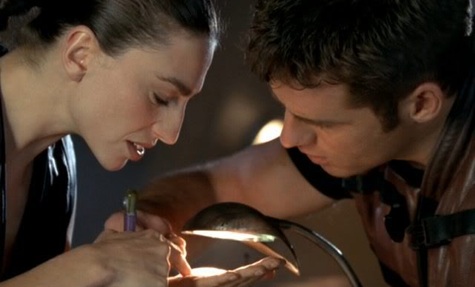
For those who know next to nothing about the show, the crux of John and Aeryn’s tale is not too complex; he’s an astronaut from Earth who’s flung across the universe, where he meets a flight jockey named Aeryn Sun, member of an elite, galaxy-dominating military force known as the Peacekeepers. The brief time she spends with him in the first episode has her dubbed “irreversibly contaminated” by her commanding officer, and she is forced to flee with the very escaped criminals who have cost her the only life she has ever known and everything she previously held dear. Problem is, this odd “human” as he calls himself has really blue eyes, and he’s all full of emotions and caring and terrible advice…
So, this is a love story in which the woman is the colder, more logical, less emotional participant to start. Rare, yet not unheard of. But it’s more clever than that; Aeryn isn’t dropped into a “frigid harpy” stereotype and left there to flounder. Her difficulties come from what boil down to cultural misunderstandings. To set up an example, the reason why the Moya’s crew can understand each other despite all speaking different languages is an injection of translator microbes that colonize the base of their brains. But the microbes can only translate for what words each character knows in their native tongue. John is shocked early on to find that Aeryn does not get a translation for “compassion”—there is no equivalent word for it among her species.
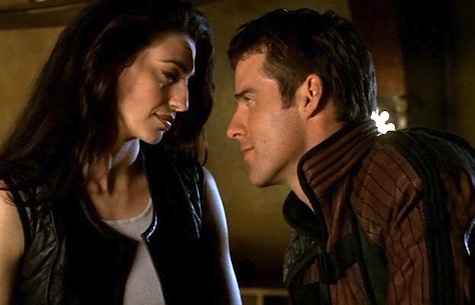
Because the Peacekeepers breed and train their own soldiers to follow orders and fall in line, Aeryn doesn’t have an emotional base. She believes that her feelings are a defect that can only get in her way. Claudia Black extended this even so far as John and Aeryn’s initial meeting—the meet cute that John lovingly refers to as “boy meets girl, girl kicks boy’s ass”—saying that the reason Aeryn reacts so violently to him is because it was actually love at first sight. The problem is, for Aeryn Sun, it could only be identified as a foreign emotion that resulted in confusion, so she believed her best course of action was to eliminate it… by eliminating the target responsible for eliciting the emotion.
If you don’t think that’s just the cutest thing ever, I honestly don’t know what to do.
So this show, with its galactic machinations and colorful characters and exotic, dangerous technology became a backdrop to the Saga of John and Aeryn. He learned about the universe and she learned about herself. Sometimes these journeys aligned well. Sometimes they did not. Sometimes they left both participants in pieces. And that was one of many reasons why few tales taking up science fiction’s hallowed halls have ever surpassed Farscape. Even today.
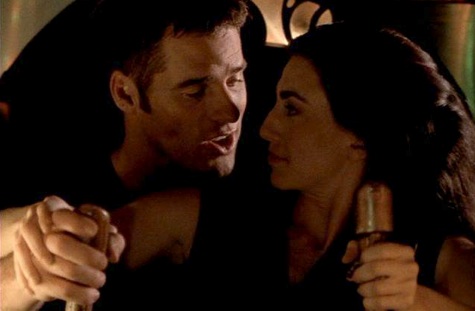
You have to give props to Farscape for making their central love story a primary driving force of the plot, not a sideshow to “more important” action. There was no will-they-or-won’t-they drama for the show’s audience to agonize over either, something we can only hope more television will move away from in the future. I would argue that for all of Chris Carter’s protests, the insistence on keeping up tension between his FBI agents on The X-Files was something that practically ruined the series and many other strong shows besides. It’s boring, and the anticipation eventually becomes a bad game. What’s the problem with allowing love to be a central tenant of your show anyway? The idea that romance destroys all motivation toward action is genuinely goofy—there’s a honeymoon period and you get over it. Life still waits on the other side.
So viewers knew from the start that John and Aeryn were attracted to one another, that they were heading toward a far more complex entanglement. Sex was never treated as their endgame, and this is EXTREMELY RELEVANT. How often is that the final play when romances are introduced to narratives? It’s what practically every romantic comedy is building up to—and how insulting is that? It’s not just the mistaken idea that sex is the most important aspect of any loving relationship, but the idea that once something is consummated, the romance suddenly stops being romantic as it is overtaken by “boring comfortable/miserable couple” status. We had sex! Now we will probably get married and have babies, and nothing else will ever come up that could make us intriguing as people ever again!
Every form of media is guilty of this (with YA fiction now becoming a primary shareholder in its stock even if the sexy time is off-camera), but film and television are the worst for it. Along comes Farscape in 1999 and sixteen episodes in, John and Aeryn have already jumped that hoop and are onto the next one. Because sleeping together does not a Happily Ever After make. Anyone who has ever spent time among human beings knows this.
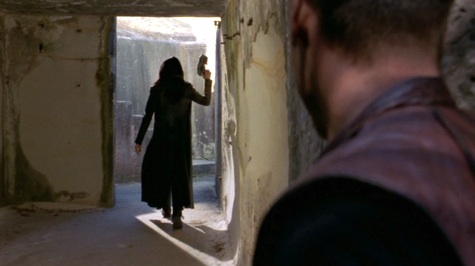
So what do this pair do in lieu of all that? Wait for it… they talk. A lot. I know—too crazy, right? Or they pointedly do not talk, but what is exciting is how real their talking and/or not talking is. So many uncomfortable conversations, aborted looks, good old-fashioned angst and anger. Sometimes there are gunfights, which Aeryn usually starts. It’s a lot easier than talking on her end.
What’s fun about John and Aeryn is that they are both epic-variety heroes, which means that they can have all that cake and eat an entirely different one too, baked for Tragedy and Big Decisions and Serious Longing. They let a coin toss decide the fate of their relationship, John goes on drugs to forget how much he cares about Aeryn when they’re going through a rough patch, Aeryn dies and comes back to life, John dies and… well he doesn’t come back to life, but he doesn’t stay dead either. Aeryn berates John for ruining her life (sometimes with a smile on her face). John has seen aliens and other worlds and other realities, but all he wants is to spend his life with her. She can pick the scenery.
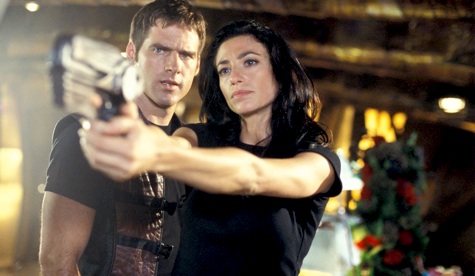
And all this drama occurs while John makes big speeches at bad guys and Aeryn stands next to him looking severe and holding a Big Damn Gun. Because they’re also a terrifyingly effective team. John can do pretty much anything with his commando backup—it just so happens that this commando is the love of his life. He doesn’t look so scary up close, but Aeryn? She terrifies people three times her size, and she barely has to blink at them. When forced to come up with false names for them on short notice, John doesn’t default to Romeo and Juliet or even Angel and Buffy; he tells everyone they’re called Butch and Sundance. It’s a more accurate comparison by far.
It’s hard to usefully express how imperative these two were to me at an impressionable age. How their love set the bar for any and all relationships. Despite all the craziness, John and Aeryn are the spacefaring equivalent of a superteam. Their road was full of pitfalls and trauma and laughter and explosions. They are everything we want love to be only moreso, at the highest clarity and sharpest relief we can stand. Every other love story goes to Ten—theirs goes to Eleven.
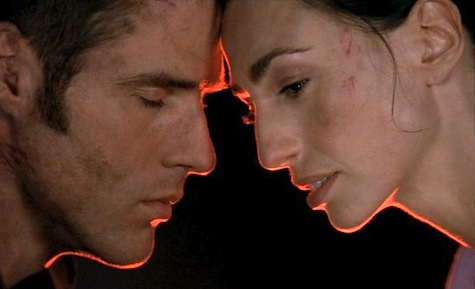
And they did it all wearing leather pants.
Emmet Asher-Perrin warns that if “I love you.” “I know.” is already too destructive for you to handle, you should never see John and Aeryn at their most dramatic. They will cleave our heart in two. You can bug her on Twitter and read more of her work here and elsewhere.










